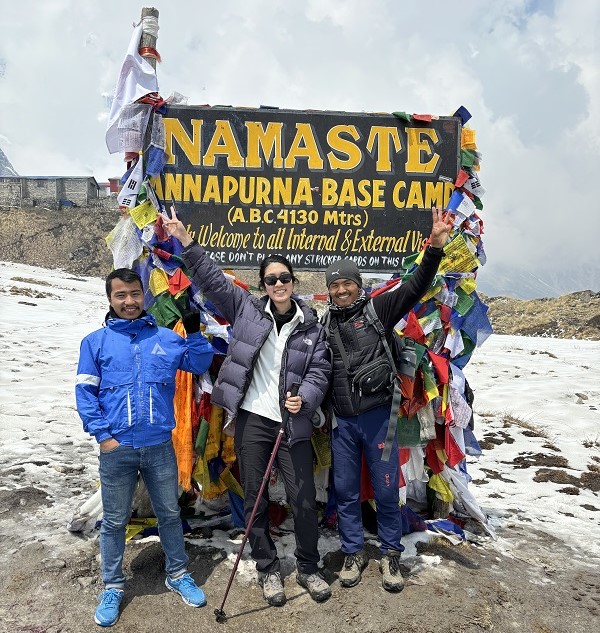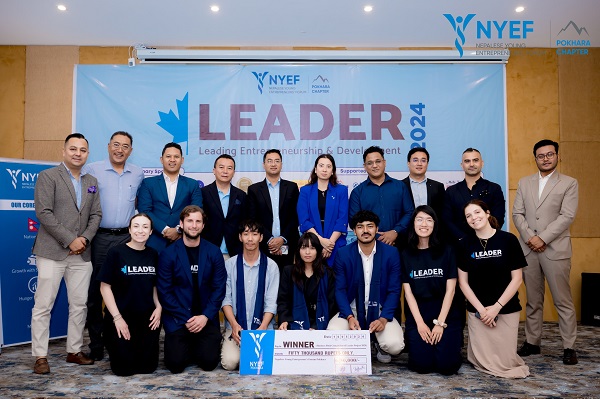Sherry Yang is an HBA ’25 candidate and curriculum coordinator with the Ivey LEADER Project, a student-led international economic development program. In May 2024, she and three other LEADER instructors travelled to Nepal to teach fundamental business skills to aspiring entrepreneurs using the Ivey case method. In her blog below, she writes about her experiences – everything from curriculum planning to a picturesque mountain trek – and the many lessons learned.
Driving along Lakeside Road in Pokhara, an idyllic vacation city in central Nepal, I took in the atmosphere: vendors hawking their handicrafts, cafés entertaining patrons with relaxing jazz music, and colourful residential buildings nestled above lively shopfronts. Our host from the Nepalese Young Entrepreneurs’ Forum (NYEF), the LEADER Project’s site partner, told us we’d feel like locals before we know it. As a LEADER instructor stationed in Nepal, I, along with three other instructors, would be calling this city home for the next three weeks. Our goal was to equip aspiring entrepreneurs in Nepal with the tools they’d need to succeed, through lectures, workshops, cases, and coaching. But although we were teachers in title, we learned just as much as the entrepreneurs did on this amazing trip.
Preparing for Pokhara
Our work in Nepal began months before we set foot on site. First, we had to design the teaching material. As a curriculum coordinator, I led my team on this and we decided on cases that were:
- Relevant to an entrepreneur;
- Situated in the countries we teach in; and,
- Accessible to participants living in emerging markets.
We then trained on delivering lectures, case discussions, and workshops and practised, practised, practised – with fellow LEADER instructors, a class of undergraduate students, and finally, an Ivey professor.
By the beginning of April, site teams were ready to fly out and teach all over the world.
Creating opportunity through a local lens
I arrived a week and a half early. I wanted to explore Nepal properly and was determined to do the Annapurna Base Camp Trek – a six-day hike to the foot of one of the tallest mountains in the world. I became immersed in the regional culture. Deeply spiritual and so welcoming, the guides, porters, teahouse owners, and hikers I chatted with all painted a picture of a highly optimistic, but struggling, nation. The best and brightest Nepalese aimed to leave the country for education and work opportunities, and many families depended on remittances.
The LEADER Project aims to be an engine for sustainable economic growth and create local opportunities. This new cultural context re-emphasized for me the importance of localizing our curriculum – using examples of successful national brands and entrepreneurs to encourage participants to think locally. The cultural context also allowed me to be a better coach, helping participants explore business ideas for problems highly catered to the Nepalese landscape.

Sherry Yang (front, centre) at the Annapurna Base Camp.
The holistic culture of entrepreneurship
Entrepreneurship takes many forms and permeates both inside and outside of the classroom. I felt like I was learning something new from everyone I met.
For instance, from our NYEF hosts, I learned how established Nepalese entrepreneurs were growing their businesses. Many of NYEF’s members are part of multigenerational family businesses, where new generations are trying to innovate on the older managerial practices and diversify into new industries. One of our NYEF guest speakers gave us a firsthand perspective on high-growth tech startups. He co-founded Nepal’s most popular learning management system, and demonstrated how leveraging customer feedback helped the venture go to market in new geographies.
From our participants, I learned about numerous unique and exciting business problems that impact Nepal. One of the teams in our Business Pitch Competition evaluated a common practice of Nepalese retailers: physically counting the inventory due to a lack of security and trust. The team then created a business plan that streamlined warehousing and introduced a digital inventory management system. Another team looked at the social issue of unpaid female labour in domestic activities like cooking. Considering the sizable population of Nepalese abroad, the team pitched the idea of having these women sell homemade pickles to those living abroad.
Even seemingly mundane activities offered some learnings. Our team fell in love with a local coffee shop called Himalayan Java. Inevitably, we discussed Himalayan Java in the strategy lecture. By the end of class, we had everyone deliberating differentiation versus cost leadership in the coffee industry.
From concepts to ideas
Thanks to the LEADER Project, I spent almost a month in Nepal and became enmeshed in the culture there. It was one of the most vibrant places I have had the privilege of teaching and learning in. Seeing participants take the concepts they learned in class, walk out the door, and return daily with bigger and better ideas, was the biggest reward of this entire experience.
I want to thank our partners at NYEF for supporting the program year after year and allowing us to explore this beautiful city.

LEADER instructors with winners of the Business Pitch Competition.



